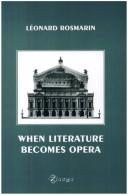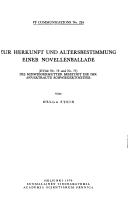| Listing 1 - 10 of 35 | << page >> |
Sort by
|
Book
ISBN: 900464766X Year: 2023 Publisher: Leiden : Brill Academic Publishers,
Abstract | Keywords | Export | Availability | Bookmark
 Loading...
Loading...Choose an application
- Reference Manager
- EndNote
- RefWorks (Direct export to RefWorks)
Perhaps no other art form in the Western world has polarized opinion to the same extent as opera. While its devotees can be almost fanatical in their enthusiasm, its detractors will dismiss lyric theatre as an impossible hybrid. Literature and music undermine one another when brought together, they maintain. Their contempt for the genre is more often than not motivated by the supposedly mediocre quality of the librettos or scripts to which the works are set as well as the implausibility of characters singing instead of speaking their emotions. But what if these much maligned scripts provided composers with the raw material necessary to convert stereotypes into exemplary figures and place them in powerfully dramatic situations? What if the unreality of opera opened up gripping vistas onto the reality of human emotions? When Literature Becomes Opera strives to answer these questions by analyzing the artistic process through which literary texts are simplified then transformed into lyric dramas. Using as examples eight outstanding operas inspired by works of French writers (Rigoletto, La traviata, Carmen, Thaïs, La Bohème, Tosca, Pelléas et Mélisande and Dialogues des Carmélites), this study demonstrates that a libretto, like a film script, enters into a partnership with the art it serves: music. When the quality of the partnership is high, all of opera's liabilities that purists take pleasure in deriding become stunning assets.

ISBN: 9042006943 9789042006942 Year: 1999 Publisher: Amsterdam Rodopi
Abstract | Keywords | Export | Availability | Bookmark
 Loading...
Loading...Choose an application
- Reference Manager
- EndNote
- RefWorks (Direct export to RefWorks)
Operas --- Operas --- Literary themes, motives

ISBN: 9514103254 Year: 1979 Publisher: Helsinki Suomalainen Tiedeakatemia
Abstract | Keywords | Export | Availability | Bookmark
 Loading...
Loading...Choose an application
- Reference Manager
- EndNote
- RefWorks (Direct export to RefWorks)
Mothers-in-law in literature --- Ballads --- -Folk ballads --- Lyric poetry --- Poetry --- Songs --- Vocal music --- Folk songs --- Literary themes, motives --- Mothers-in-law in literature. --- Literary themes, motives. --- -Literary themes, motives --- Folk ballads
Book
Year: 1974 Publisher: Lodève : Association Rosicrucienne,
Abstract | Keywords | Export | Availability | Bookmark
 Loading...
Loading...Choose an application
- Reference Manager
- EndNote
- RefWorks (Direct export to RefWorks)
Music --- Music --- Musique --- Operas --- Operas --- Operas --- Operas. --- Opéras --- Philosophy and aesthetics. --- Philosophy and aesthetics. --- Philosophie et esthétique. --- Literary themes, motives. --- Literary themes, motives. --- Thèmes, motifs littéraires.
Book
ISBN: 1443860840 9781443860840 1443856665 9781443856669 Year: 2014 Publisher: Newcastle Cambridge Scholars Publishing
Abstract | Keywords | Export | Availability | Bookmark
 Loading...
Loading...Choose an application
- Reference Manager
- EndNote
- RefWorks (Direct export to RefWorks)
On 29 February 1836, Les Huguenots, a grand opera by Giacomo Meyerbeer (1791-1864), with words by Eugène Scribe (1791-1861) and Émile Deschamps (1791-1871), was performed for the first time, at the Paris Opéra. It was to be one of the most successful productions ever staged at the Opéra, with 1,126 performances in Paris over the next hundred years, and, in the process, breaking all box office records. It became Meyerbeer's most popular work, with thousands of stagings throughout the world. L...
Operas --- Opera --- Literary themes, motives. --- Themes, motives, Literary --- Les Huguenots --- Meyerbeer, Giacomo
Book
Abstract | Keywords | Export | Availability | Bookmark
 Loading...
Loading...Choose an application
- Reference Manager
- EndNote
- RefWorks (Direct export to RefWorks)
Romanticism in music --- Music and literature --- Congresses. --- Congresses --- Liszt, Franz, --- Literary themes, motives
Book
ISBN: 9781501763885 1501763881 Year: 2022 Publisher: Ithaca, New York: Cornell University Press,
Abstract | Keywords | Export | Availability | Bookmark
 Loading...
Loading...Choose an application
- Reference Manager
- EndNote
- RefWorks (Direct export to RefWorks)
"Discusses songs by the troubadours, trouvères, and Guillaume de Machaut, performed live and on the page, in the context of antique, late antique, and medieval thought and poetic practice and in the light of later opera. Topics include cosmology, education, astronomy, breath, beasts, monsters, hybridity, imagination, life, and death"
Songs --- Singing --- Philosophy and aesthetics. --- Literary themes, motives. --- History and criticism. --- Philosophy. --- Chansons --- Chant
Book
Year: 2019 Publisher: Ann Arbor, Michigan : University of Michigan Press,
Abstract | Keywords | Export | Availability | Bookmark
 Loading...
Loading...Choose an application
- Reference Manager
- EndNote
- RefWorks (Direct export to RefWorks)
Opera --- Supernatural in opera --- History and criticism. --- Political aspects --- Literary themes, motives --- Censorship --- Chinese drama
Book
ISBN: 3846747149 Year: 2009 Publisher: Paderborn : Wilhelm Fink Verlag,
Abstract | Keywords | Export | Availability | Bookmark
 Loading...
Loading...Choose an application
- Reference Manager
- EndNote
- RefWorks (Direct export to RefWorks)
Nomadisierend, ohne Heimat und Herkunft, verbunden mit der Vorstellung des Ungeordneten, bezeichnet die 'Zigeunerin' zugleich ein poetisches Ideal zahlreicher Autoren des 19. und 20. Jahrhunderts. Mit klar definierbaren Stereotypen, die häufig mythemischen Charakter haben, werden Zigeunerfiguren in der Literatur, aber auch in Oper und Film, inszeniert und in ihrer Alterität festgeschrieben. Das 19. Jahrhundert ist in besonderer Weise von einem ambivalenten Umgang mit dem als exotisch empfundenen Anderen gekennzeichnet. Die Zigeunerin ist die zugleich ein- wie ausgeschlossene Dritte, eine hybride Figur, die immer neue Bedeutungen generiert und besonders in Umbruchsituationen zu finden ist.
Romanies in literature. --- Operas --- Romanies in motion pictures. --- Romanies in popular culture. --- Literary themes, motives.
Book
ISBN: 9780472074303 047207430X 9780472054305 0472054309 Year: 2019 Publisher: Ann Arbor University of Michigan Press
Abstract | Keywords | Export | Availability | Bookmark
 Loading...
Loading...Choose an application
- Reference Manager
- EndNote
- RefWorks (Direct export to RefWorks)
"Resisting spirits is a reconsideration of the significance and periodization of literary production in the high socialist era, roughly 1953 through 1966, specifically focused on Mao-era culture workers' experiments with ghosts and ghost plays. Maggie Greene combines rare manuscript materials--such as theatre troupes' annotated practice scripts--with archival documents, memoirs, newspapers, and films to track key debates over the direction of socialist aesthetics. Through arguments over the role of ghosts in literature, Greene illuminates the ways in which culture workers were able to make space for aesthetic innovation and contestation both despite and because of the constantly shifting political demands of the Mao era. Ghosts were caught up in the broader discourse of superstition, modernization, and China's social and cultural future. Yet, as Greene demonstrates, the ramifications of those concerns as manifested in the actual craft of writing and performing plays led to further d ebates in the realm of literature itself: If we remove the ghost from a ghost play, does it remain a ghost play? Does it lose its artistic value, its didactic value, or both? At the heart of Greene's intervention is "just reading": the book regards literature first as literature, rather than searching immediately for its political subtext, and the voices of dramatists themselves finally upstage those of Mao's inner circle. Ironically, this surface reading reveals layers of history that scholars of the Mao era have often ignored, including the ways in which social relations and artistic commitments continued to inform the world of art. Focusing on these concerns points to continuities and ruptures in the cultural history of modern China beyond the bounds of "campaign time." Resisting Spirits thus illuminates the origins of more famous literary inquisitions, including that surrounding Hai Rui Dismissed from Office, by exploring ghost plays such as Li Huiniang that at first appear more in nocent. To the contrary, Greene shows how the arguments surrounding ghost plays and the fates of their authors place the origins of the Cultural Revolution several years earlier, with a radical new shift in the discourse of theatre."--Provided by publisher.
Opera --- Supernatural in opera --- History and criticism --- Political aspects --- Literary themes, motives --- Censorship
| Listing 1 - 10 of 35 | << page >> |
Sort by
|

 Search
Search Feedback
Feedback About UniCat
About UniCat  Help
Help News
News